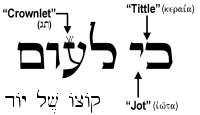|
So Why Study Biblical Hebrew? |
|
Some Reasons for the Christian include... |
|
|
|
4. The Language of Modern Israel
Hebrew is the only ancient language to have been revived as a modern spoken language. Today Hebrew still serves as the language of Judaism, and is also the official language of the state of Israel. Your study of Hebrew will help you better appreciate modern Jewish culture and the people living in Israel. 5. Bible Study The study of Hebrew, and especially obtaining a sense of fluency in the underlying Hebraic / Jewish mindset that informs Scripture, will make you a better student of the Bible. The Bible (both the Old and New Testaments) is a decidedly Jewish book, and the authors of the pages of Holy Scripture were all Jews who were familiar with the Hebrew language and Jewish thinking. As it is written in the New Testament:
“Study to shew thyself approved unto God, a workman that needeth not to be ashamed, rightly dividing the word of truth.” (2 Tim 2:15)
It is my earnest contention that
you simply cannot readily understand the meaning of the New Testament
authors without understanding of the Hebraic mindset that
hermeneutically underlies their message. Many problems in exegesis and
doctrine arise because non-Jews have imposed a Greek/Western mindset
onto the pages of the Jewish Scriptures.
6. Jewish Literacy The study of Hebrew will enable you to better comprehend Jewish concepts and literature. You will be able to better appreciate the struggle of the Jewish people over the millennia and more effectively sympathize with their collective plight. You will begin to delight in your shared destiny as a child of Abraham by faith, enjoying the covenantal blessings given to the patriarchs. You will understand the importance of Shabbat, the Jewish Holidays, and how they are best understood from a Messianic perspective. 7. Christian Leaders Most Christian leaders who revere the Scriptures encourage digging into the Hebrew text. Even Martin Luther, who sadly became overtly anti-Semitic later in life, wrote:
"The
Hebrew language is the best language of all ... If I were younger I
would want to learn this language, because no one can really understand
the Scriptures without it. For although the New Testament is written in
Greek, it is full of Hebraisms and Hebrew expressions. It has therefore
been aptly said that the Hebrews drink from the spring, the Greeks from
the stream that flows from it, and the Latins from a downstream pool."
--Martin Luther, Table Talk, quoted in Pinchas E. Lapide, Hebrew in the Church, trans. Erroll F. Rhodes (Grand Rapids: William B. Eerdmans Publishing Co., 1984). |
|
|
|||||||


No comments:
Post a Comment